Porcupine quills were used by Native people of the Great Lakes area as decorating materials long before the introduction of seed beads by the European traders. This seemed to be true where ever this animal was found in the wooded areas of the northern continent.
Quills were dyed colors with natural dyes, used in their round state, or flattened and used as a platting material. The most renowned decorative use of quills in the Great Lakes area was and continues to be on birch bark baskets.
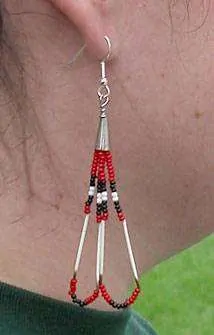
In recent times, quills have become popular for use in earrings in combination with beads and other findings.The project shown here uses the quills as decorative natural tubes cut to desired lengths. They can be left as natural white, or dyed colors by simmering them in a pan of fabric dye until they reach the desired color.=
The first step is always to clean the quills by simmering them in hot water and then wiping them clean. Match them up in size and colors for your project, and cut off the sharp tips on both ends. Until they are cut, handle the quills with care. They are sharp!
Photo 1 shows the details of a simple design of dangle earrings. Variations of this pattern is possible by changing count and color patterns of the beads.
Start by threading up a beading needle with about 18 inches of size “B” nylon thread. the thread is used as a single thread, not doubled in the stitch. Coat the thread with bees wax or thread conditioner. Tie the bottom end of the thread on the eye of an eye pin as shown in Photo 2. Create the pattern of the first loop and tie it on the eye with a knot. Do not cut the line. Duplicate that loop and tie off on the eye again with a double knot. Trim off the excess thread. A touch of glue on the knots will harden them.
The quills may not be hollow. You might need to use a jewelry pliers to carefully push the needle and pull the thread through the core of the quill. Another technique is to start the needle through the quill, then set the eye of the needle on the table and pull down the quill.
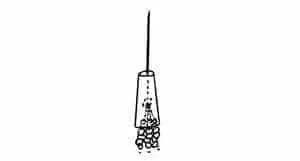
Metal cones as shown in Figure 3 are an excellent way to cover the messy knot ends and to provide the hinge position to attach the ear wire. Slip the eye pin wire end through the cone as shown. Finish by making a loop, (if you don’t have a round nose pliers, form the loop over a medium size nail) and twisting the end around the wire at the top of the cone as shown in Figure 4 and in Photo 5 when using the pliers. (This Photo 5 doesn't show the bead and quill dangles in the cone however.) Cut off the excessive wire.

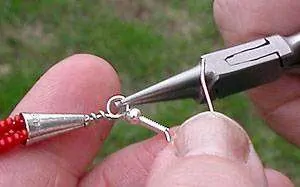
Attach the ear wire to this loop as shown in Photo 6. When attaching french hooks to earrings, always open the bottom loop of the hook by bending it sideways. insert the earring through the opening and bend it back to finish. never open these by bending the circle of the loop open.
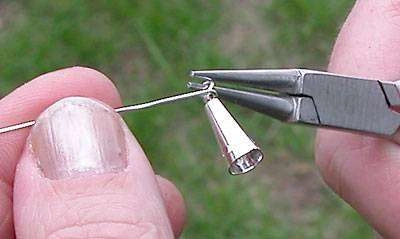
Other earring designs as shown in Figure 7 may be developed using quills and these same materials. We encourage you to experiment with your own designs. Work out ideas to hide the knots near the top of the earring inside beads or in cones as we have here.
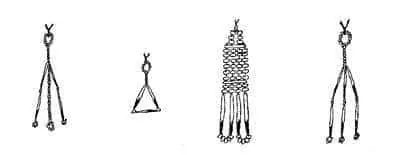
Copyright: 2005 by Loren Woerpel, Noc Bay Publishing, Inc.
Last Updated on December 13, 2023 by Paul G
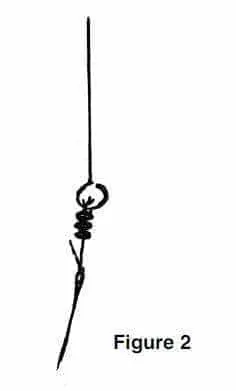

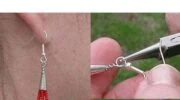
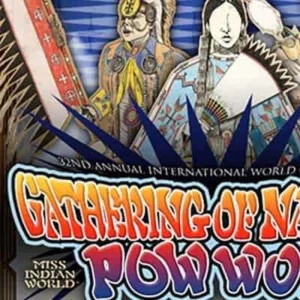
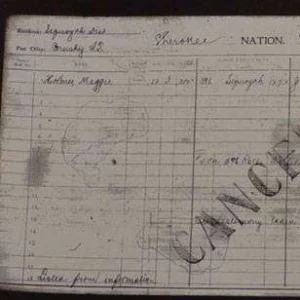
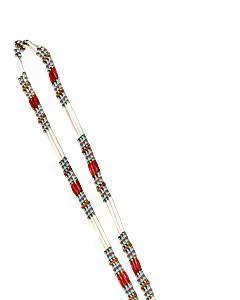
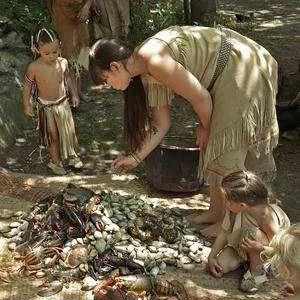
Tara E Trudell
says:Thank you for this and any suggestions on how to pierce the quill length wise for earrings/dangle would be greatly appreciated.
Susan Driskill
says:Is there any suggestions on how to keep your quills from splitting when beading? I made some dangles and the tip split. Can you coat them with anything to strengthen them?
william montez
says:I am looking for a porcupine headdress or how to make one please help???
Betsy
says:I didn’t know about simmering the quills. I already trimmed the pointy ends, so will it ruin them if I simmer them now and for how long. also, mine look kind of yellow, is there a way to get them to look nice and white? thanks
Ramona Three Legs
says:Im trying to make some quill earring, but their different from these. im tryna find out how to start the top, idont’have those cone thing. i jsut wanna use beads &nd quills’?
Please help me. .
Paul G
says:Check out craft forum – newpowwows.www.powwows.com/gathering
Noc Bay
says:Ramona, Figure 7 shows some designs that do not use a cone with the beads and quills. In your planning, design it to form a loop of beads at the top of the earring design. Then attach a ear wire to that loop. Figure 7 doesn’t show the whole ear wire attachments. Generally, to get those loops, start your sewing from the bottom of your design, and to make the loop at the top, loop about 6 to 8 beads then sew back down inside the design to a spot where you can hide a knot at or near the bottom.
Noc Bay
says:The simmering process in a pan of hot water for about 10 minutes is the way to get off the grease and dirt often coating quills collected in the wild. Now days some vendors will clean the quills that way before selling them in a bulk pack. Wiping them down after simmering them by pulling them through a cleaning rag is what will make them as bright white as they can be. You should be able to clean your quills that way even though you have cut off the tips.
Kitla
says:Looks delicious! Love your your rceepis! I have been visitng your blog for quite some time (never left a comment before) and every time I’m amazed at your beautiful pictures.